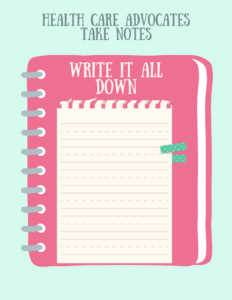Yes, lawyers file lawsuits but often the Virginians who call us seeking advice as to whether their loved one has been a victim of medical malpractice are calling in the middle of a health care trauma and need more than just legal advice.
They need help becoming a health care advocate for their loved ones, so permanent life changing injury doesn’t occur.
Many personal injury lawyers would simply decline the lawsuit (often without explanation or worse, with an excuse of being too busy) but our firm tries to help the people who seek our advice with additional tools to protect their loved ones. We try to teach our callers to be better advocates. Best case scenario is that your loved one gets better, suffers no permanent injury and does not have a lawsuit.
Worst case scenario is they do suffer permanent injury or worse, and a lawsuit simply tries to seek some financial compensation for the loss already suffered.
 But how can normal patients and their families advocate for better healthcare in our often broken system?
But how can normal patients and their families advocate for better healthcare in our often broken system?
- TAKE NOTES – on everything. Doctor’s names, lab values, nurses names, possible diagnosis, your loved one’s complaints, etc. The records are written for other health care providers and don’t always tell the whole picture. Further, in a system of hospital based medicine where in patients don’t even know the name of their doctors, or who is on call – it is not enough to trust the physicians have the space and time to place your loved one first.
- ASK QUESTIONS – Who is the doctor on call? When can I speak to them? What do the lab results show? What tests are needed? Why is she on X medication? Why isn’t she on X medication? Did you know she is allergic to Y? DO NOT TRUST everything is known to the providers. DO NOT TRUST that tests that have been ordered have been reviewed. DO NOT TRUST that the Cardiologist is speaking to Pulmonologist etc. ASK ALL THE QUESTIONS IN KINDNESS until you get satisfactory answers.
- BE PRESENT. If you aren’t in the facility, you can’t ask questions. You can’t pay attention. I know it is hard to be present for a loved one that lives many states away, but if you cannot be present, you cannot be an effective advocate.
- BE KIND. No one likes a jerk, and no one wants to help someone who is making thinly veiled threats to hire a lawyer. You certainly get more flies (and better care) with honey.
- BE HUMBLE. You are likely not a nurse or a doctor. You know your body – and so be an advocate for your own body, and or the body of your loved one, but if you are not also humble, it is easy for over worked providers to provide less care to your loved one.
- TAKE PHOTOS. We get asked all the time whether patients should record conversations with providers. Certain facilities do not allow that. We cannot advise it. But photos can be very helpful. Not of your loved ones suffering necessarily, but of drawings physicians create to explain plans of care, medications, lab values, etc.
- WORRY ABOUT YOUR HEALTH NOW – LAWSUIT later. You have two years to file suit – there is no rush. Put your energy toward advocating for your loved one now, and when they are home safe – then call a lawyer.
Being a healthcare advocate is not an easy job. It is not for the faint of heart – but being organized can lead to better care.
Lauren Ellerman
